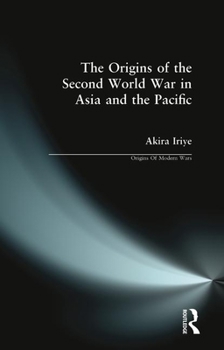The Origins of the Second World War in Asia and the Pacific
(Part of the Origins of Modern Wars Series)
Select Format
Select Condition 
Book Overview
Professor Iriye analyses the origins of the 1941 conflict against the background of international relations in the preceding decade in order to answer the key question: Why did Japan decide to go to war against so formidable a combination of powers?
Format:Paperback
Language:English
ISBN:0582493498
ISBN13:9780582493490
Release Date:April 1987
Publisher:Routledge
Length:214 Pages
Weight:0.55 lbs.
Dimensions:0.5" x 5.4" x 8.5"
Customer Reviews
1 rating
First rate history for the non-specialist.
Published by Thriftbooks.com User , 19 years ago
Akira Iriye is Charles Warren Professor of American History at Harvard University, and is a noted historian of international institutions. This 1987 book is a well organized and well edited introduction to a complicated subject, the origins of what the Japanese call The Pacific War, and which we know as WWII in Asia and the Pacific. The book's organization is straightforwardly chronological. His account of these years is less dramatic but easier to follow than that of John Toland in "The Rising Sun", even though Toland is a better writer than Iriye. Iriye has the advantage of having that period as his primary subject, whereas Toland was laying the groundwork for a dramatic account of the war itself. And Iriye takes pains to explain his conclusions in several different ways, a habit no doubt learned from teaching college undergraduate students, who are the primary target audience of this book. Iriye clearly describes the step by step process by which Japan entrapped itself in a net from which it was in the end only able to escape by engaging in a suicidal war. He shows how extremely naive Japanese political and military leaders were to think that they could overturn the existing order in Asia without serious consequences. Ironically, most of them - Konoye, Tojo, Yamamoto, and others - could see the trap they were heading into, yet believed that there was no way out that would not be a disaster for Japan, and that war was the only way to preserve Japanese honor. Contrary to some impressions, Japanese at the highest levels of leadership knew very well that Japan was no match for the United States militarily. But things had deteriorated to the point that even the Atlantic Charter, a precursor of The United Nations, was viewed by the Japanese leadership simply as a declaration of war on Japan by the Anglo-American powers. Iriye leaves little doubt that once Japan signed the Tripartite Pact with Hitler and Mussolini in 1938, FDR and his cabinet - Hull, Stimson, Knox, Acheson - saw war with Japan as inevitable. Their only goal was to try to gain time in order to avoid having to fight in both Europe and Asia at the same time. In the event, of course, America did both. A major irony of Japan's joining the Axis powers is that it provided none of the benefits Japan had hoped to gain from the alliance, while at the same time it ended all possibility of a rapprochement with Britain and the US. Japan had literally backed out onto a tree limb and then proceeded to saw it off. Iriye delineates the development of China's influence on American policy in the Far East. By the late 1930's, China was clearly identified in the eyes of the American public as the victim of unjustified Japanese aggression. This was indeed an accurate assessment of the situation, but the strength and emotion with which it was held by the American public gave the Roosevelt administration very little room to maneuver with Japan, even had it been inclined to do so. An




